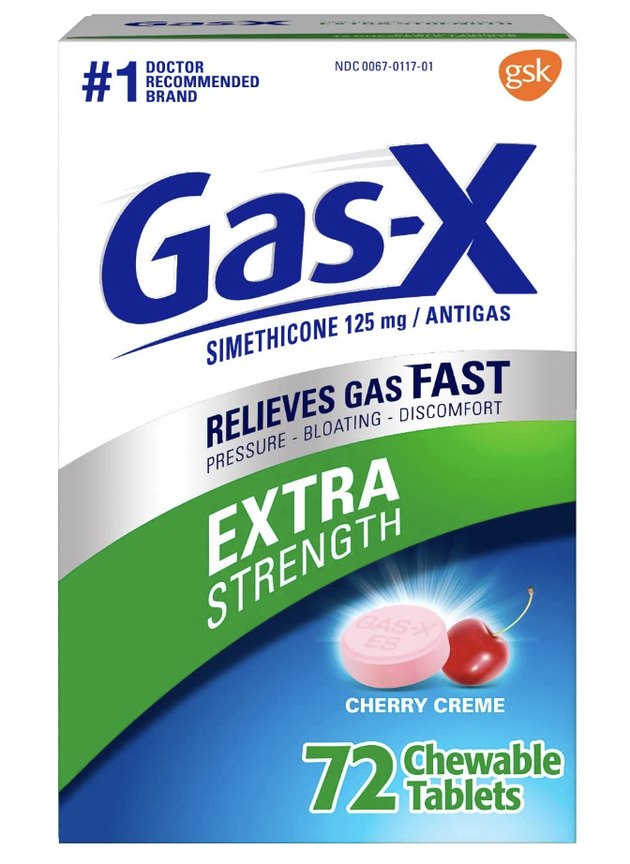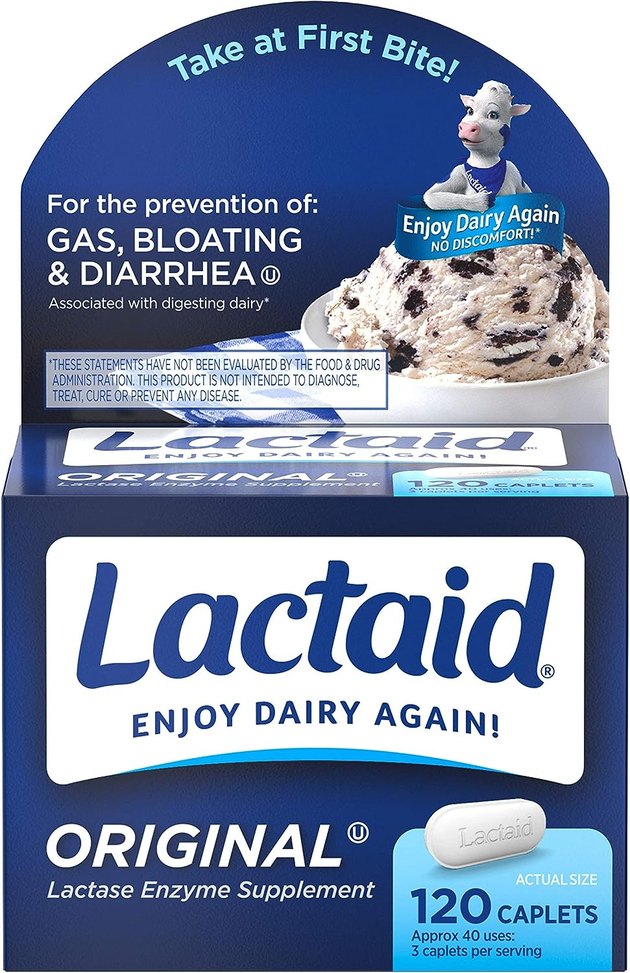
Gas in your digestive system is relatively normal and usually released through belching or flatulence. But when excess gas can't escape, it gets trapped. As a result, gas can cause back pain and other uncomfortable symptoms.
Here's a look at what causes trapped gas, the signs of gas pain in your back, other conditions that cause similar pain and how to treat it.
Video of the Day
Video of the Day
Tip
Gas can cause back pain when it gets trapped in your intestines during digestion, when you swallow too much air or if you have a chronic digestive condition. But keep in mind that other issues can cause back pain, too, such as gallstones or ulcers.
What Causes Gas to Get Trapped?
Gas has both external and internal causes, Neil Gupta, MD, an associate professor of gastroenterology and regional director of digestive health at Loyola University Medical Center in Maywood, Illinois, tells LIVESTRONG.com.
And when that gas gets stuck in your intestines, pain can ensue. Stomach and back pain from gas can feel like a sharp, stabbing or dull pain that moves from the lower back up into the neck, according to San Ramon Urgent Care & Clinic.
"Trapped gas symptoms can include cramping or bloating anywhere along your digestive system," Dr. Gupta says.
Trapped gas pain locations can also vary. For example: "Gas pain can be felt in your upper back when [it] is trapped in a part of your colon in the back of your abdomen called the retroperitoneum," Dr. Gupta says.
1. Swallowing Air
The main culprit for gassy back pain? Swallowing too much air, Dr. Gupta says. In fact, your upper back pain due to gas could be from this phenomenon.
Swallowed air is the primary cause of increased gas in your stomach, per the Mayo Clinic. It can result from a variety of factors, like drinking or eating too fast, using a straw or drinking carbonated beverages like beer or soda.
Chewing gum, taking fiber supplements or eating food and drinks that contain artificial sweeteners can also contribute to the problem.
2. Gas Released During Digestion
Gas in your colon forms when bacteria ferment undigested carbs like fiber and some starches and sugars, per the Mayo Clinic. Higher-fiber foods like beans or whole grains tend to lead to more gas, according to the Cleveland Clinic.
While bacteria consume some of that gas, the remainder is released in flatulence, something that normally occurs 14 to 23 times a day, according to Johns Hopkins Medicine.
3. Certain Chronic Conditions
If your gas pain is constant, excessive or accompanied by other digestive problems — and you've ruled out the above reasons — a medical condition may be to blame, per the Mayo Clinic.
"Any condition that causes your digestive system to slow down increases the risk for trapped gas," Dr. Gupta says. "These include common conditions like chronic constipation and diabetes."
Chronic intestinal diseases like diverticulitis, ulcerative colitis, Crohn's disease, food intolerances like lactose- or gluten-intolerance and small bowel bacterial overgrowth cause trapped gas, leading to back pain, per the Mayo Clinic. These conditions can also create lower back pain due to gas, in particular.
If too much gas gets trapped at bends in your colon (called flexures), you may develop a disorder known as splenic-flexure syndrome, per Johns Hopkins Medicine. This severe gas buildup can cause pressure, pain and bloating, according to June 2020 research in Intestinal Research.
Other chronic conditions that can cause back pain include gallbladder disease, inflammation/arthritis of the spine and low back, chronic pancreatitis (permanent swelling of the pancreas) and peptic ulcer disease.
Warning
If your gas pain is accompanied by other symptoms like weight loss, diarrhea or bloody stool, check in with your doctor to see if a medical condition may be to blame.
How Long Does Trapped Gas Last in Your Back?
According to the Mayo Clinic, you pass gas about 20 times per day, but this could be more if you have a certain gastrointestinal condition. This means that gas can pass pretty quickly through your body. If you have trapped gas in your stomach or back, it can last anywhere from minutes to hours, or until you use a treatment option like antacids to help relieve the pain. If your gas pain lasts for days, call your doctor.
9 Other Conditions That Cause Back Pain
"Although gas is a common cause of back pain, there are other more serious causes that need to be considered when you have belly pain that is felt in your back," Dr. Gupta says.
Here, learn what causes back pain besides trapped gas:
1. Acute Pancreatitis
Acute pancreatitis is inflammation of the pancreas — a long gland in your upper abdomen situated behind your stomach — and it can cause backaches, according to the Mayo Clinic.
Symptoms may include:
- Pain in your upper abdomen that radiates to your back
- Pain that worsens after eating
- Fever
- Tenderness in your belly
- Nausea
- Vomiting
- Rapid pulse
2. Gallstones
Gas can cause back pain between your shoulder blades, but this kind of pain can also sometimes be caused by your gallbladder.
The Mayo Clinic defines gallstones as digestive fluid, called bile, that thickens into hardened deposits in your gallbladder duct. While gallstones can be asymptomatic, they can sometimes create a blockage that results in the following symptoms:
- Rapidly increasing pain in your upper right or central abdomen
- Pain between your shoulder blades or in your right shoulder
- Nausea
- Vomiting
3. Ulcer
Ulcers may also be to blame for back pain. A duodenal ulcer is an ulcer that forms in the first part of your small intestine, according to Dr. Gupta. He says it can lead to:
- Burning pain between your sternum and belly button
- Back pain
4. Kidney Stones
Kidney stones are another potential cause of both stomach and back pain, per the Mayo Clinic. Symptoms include:
- Severe fluctuating pain on your side and back (below your ribs)
- Pain that fans out to your abdomen and groin
- Painful urination
- A strong need to pass urine more often or urinating in smaller amounts
- Blood-tinged, cloudy or putrid urine
- Nausea
- Vomiting
- Fever
- Chills
5. Urinary Tract Infection
When you have a urinary tract infection (UTI), you may often experience pelvic and lower stomach pain along with back pain. If the infection spreads into your kidneys, you could even experience upper back pain on either side of your spine, per the Centers for Disease Control and Prevention (CDC).
Other symptoms of a UTI include the following, per the CDC:
- Pain or burning while urinating
- Frequent urination
- Feeling the need to urinate despite having an empty bladder
- Bloody urine
- Pressure or cramping in the groin or lower abdomen
If it turns into a kidney infection, you could experience the following, per the CDC:
- Fever
- Chills
- Lower back pain or pain the side of your back
- Nausea or vomiting
6. Menstruation
When people with uteruses get their period, they may experience symptoms similar to back pain from gas. You may feel lower abdominal cramping that spreads into your low back.
Some people even experience GI upset (i.e., gas and bloating) due to their period, per the National Institute of Child Health and Human Development (NICHD).
Other symptoms of menstruation can include the following, per the NICHD:
- Bloating or sore breasts
- Food cravings
- Mood swings and irritability
- Headache
- Fatigue
Tip
If you have severe menstrual cramps and heavy bleeding, see your doctor to rule out conditions like endometriosis, ovarian cysts or uterine fibroids, which can cause symptoms similar to back pain from gas.
7. Pregnancy
People who are pregnant will feel low back pain especially as they get further along in pregnancy. This is because the extra weight on the front of your body can strain your back and hips, per Johns Hopkins Medicine.
Additionally, you may get back pain from gas while pregnant, as GI symptoms are common during pregnancy, per the American Pregnancy Association.
8. Fibromyalgia or Chronic Pain
Fibromyalgia is a chronic disorder that causes pain and tenderness throughout the body, along with fatigue and trouble sleeping. While its cause is still largely unknown, fibromyalgia is often seen in people with other chronic conditions like arthritis, lupus or depression, per the National Institutes of Health (NIH).
Some of the most common pain points in people with fibromyalgia include the lower back (on either side of your spine) and your upper back between your shoulder blades, per New York Presbyterian Hospital.
9. Back Injury
If back pain is your only symptom, a true back injury could be to blame. You could have a pulled back muscle, a muscle strain or a bruise. Or, you could have a more serious spinal injury like a herniated disc or fracture, per the National Library of Medicine (NLM).
Depending on the type of injury, or if it's affecting your everyday life (i.e., you can't walk or lift heavier objects), you will need to see your doctor to get an X-ray, per the NLM.
How to Get Rid of Gas Pain in Your Back
While getting rid of gas-induced back pain once and for all may require managing a chronic condition, there are some measures you can take to ease aches in the short-term.
1. Try Gas-Reducing Medicine
Over-the-counter (OTC) medicines like antacids can help ease your gas symptoms, according to the Cleveland Clinic. Anti-foaming agents like simethicone (Gas-X) can also help reduce discomfort due to gas, per the Mayo Clinic.
Other non-prescription enzyme supplements — like Lactaid or Beano — can help prevent discomfort from lactose intolerance or trouble digesting sugars, respectively.
2. Use a Heating Pad
Applying heat to your back may also help ease backaches, according to the Mayo Clinic.
University of Michigan Health recommends heating your back for 15 to 20 minutes at a time with the help of a heating pad or hot shower.
3. Exercise
Though it may sound counterintuitive to hit the gym when your back hurts, exercise can help support digestion and release gas trapped in your digestive tract, according to the Cleveland Clinic.
Sticking to a regular exercise routine can also help prevent future gas buildup.
You can also try specific exercises to reduce stomach gas, like yoga's child pose or spinal twist.
4. Limit Foods and Drinks That Give You Gas
If you especially wake up gassy in the morning, starting the day with food that reduces gas is important.
Limiting foods and drinks that make you gassy can also help stave off back pain. Per the Mayo Clinic and the Cleveland Clinic, some common culprits include:
- High-fiber foods like beans, fruits and whole grains
- Cruciferous vegetables like cabbage, cauliflower, broccoli, Brussels sprouts and asparagus
- Fermented foods like kombucha or kimchi
- Dairy products if you're lactose intolerant
- Sugar substitutes and artificial sweeteners
- Carbonated drinks
In the meantime, you can eat foods that don't cause gas, like berries, bell peppers, rice or lean proteins like chicken, instead. A temporary change in diet can make a big difference in reducing your gas symptoms.
When to See a Doctor
If your back pain from gas is not relieved from over-the-counter remedies, or lasts for more than a day, it may be best to see your doctor to determine the cause and explore possible treatment options.
If you have back pain accompanied by other concerning symptoms like vomiting, diarrhea, fainting or shortness of breath, call your doctor or go to the nearest emergency room.
The doctor may request tests like an X-ray, MRI, blood test or colonoscopy to diagnose your issue and determine the best treatment.
- Mayo Clinic: “Gas and Gas Pains”
- Neil Gupta, MD, associate professor of gastroenterology, regional director, digestive health, Loyola University Medical Center, Maywood, Illinois
- Johns Hopkins Medicine: "Gas in the Digestive Tract"
- Mayo Clinic: “Pancreatitis”
- Mayo Clinic: “Gallstones”
- Mayo Clinic: “Kidney Stones”
- Cleveland Clinic: "Are You Passing Too Much Gas? 6 Tips for Relieving Flatulence"
- Cleveland Clinic: "Gas"
- Mayo Clinic: "Back pain"
- University of Michigan Health: "Use Heat or Ice to Relieve Low Back Pain"
- Intestinal Research: "Bloating in a supine position"
- Mayo Clinic: Simethicone (Oral Route)
- Mayo Clinic: "Gas and Gas Pains"
- CDC: "Urinary Tract Infection"
- NICHD: "What are the symptoms of menstruation?"
- Johns Hopkins Medicine: "Back Pain in Pregnancy"
- American Pregnancy Association: "Gas During Pregnancy"
- National Library of Medicine: "Back Injuries"
- National Institutes of Health: "What Is Fibromyalgia?"
- New York Presbyterian Hospital: "Fibromyalgia Tender Points"
Is this an emergency? If you are experiencing serious medical symptoms, please see the National Library of Medicine’s list of signs you need emergency medical attention or call 911.





